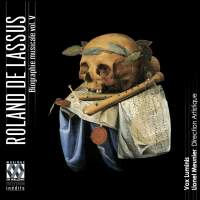Texte paru dans: / Appeared in: |
|
|
Outil de traduction ~ (Très approximatif) |
|
|
Reviewer: Barry
Brenesal This fifth volume in Musique en Wallonie’s “musical biography” dedicated to the works of Roland de Lassus (or Orlandus Lassus) is the last. From first through fourth, they moved forward in time, following the composer’s secular and sacred works, each disc assigned to a different performing ensemble. The first volume, Années de jeunesse, was evidently missed by Fanfare, but for those who are tracking this series, the second, Le temps de la faveur, was reviewed by J. F. Weber (Fanfare 38:2) and myself (Fanfare 36:5). The third, Le temps des conflits, was once again was reviewed by Weber and myself (Fanfare 38:2), while Weber alone reviewed the fourth, La vieillesse (Fanfare 38:5). That fourth release concerned itself with both the circumstances of Lassus in old age, and the music he produced at that time, as recorded by Paolo da Col and Odhecaton. This final volume, “Lassus the European,” concentrates on the spread of his music internationally throughout his life via publication. There is a definite need for essays detailing the often exasperating interrelationship between composers in the 16th century and music publishers—a breed who were sometimes referred to as lying scoundrels, deceiving the public and printing heavily corrupt editions without license. What we have here, though, is more of a moderately researched excuse to find publication pegs upon which to record individual selections. Not that there is anything wrong with yet another opportunity to hear Lassus, especially since much of the music on this album is not otherwise currently available on disc, most especially since the music is without fail magnificent. The series abandons Masses here, but supplies of mix of 20 selections that include chansons, sacred and secular motets, madrigals, a moresque (a villanella in dialogue form), and a Marian antiphon. They chronologically follow the composer’s career, and as with past releases in this series, aim to present as broad a diversity of textures, techniques, emotions, and linguistic preferences as possible. Some are manneristic, in response to a specific textual element. A good example is the short motet Concupiscendo concupiscit, in which ecstatic worship is portrayed as a destabilizing process mirrored by non-functional harmonies and the occasional chromatic progression. At the other end of the expressive scale is the parody of a courtly lover serenading his maiden fair, O Lucia, miau, miau. This is a moresque, a delightfully scurrilous little dialog between a lover, complaining in drooping phrases of his treatment after singing a serenade, and his sweetheart, who’s got quite a filthy mouth on her. (The English translation is ridiculously watered down when compared to both the Italian original and German translation, a problem I’ve noted before a few times in these pages. Calling him a “soiled bottom,” indeed.) I’ve had only two previous opportunities to become familiar with Vox Luminus, a recent composite release of music by Cipriano de Rore divided among six ensembles (Ricercar 355), and Keiser’s Brockes-Passion (Rameé 1303). The latter, which featured a lot of solo work, gave me a very mixed impression of the group. Here, with very limited solo opportunities, it is easier to focus on their performance as a unit. I was left with an impression of a group of extremely well-trained voices in which blend was a secondary goal behind phrasing and clarity of the parts. That isn’t to say that they are incapable of blending beautifully; Ó doux parler gives the lie to that, though I would still call theirs closer to an Italianate sound (Vox Luminus is Belgian) than an English or French one. More typical of their approach is Creator omnium, Deus, with all the voices in every lengthy chord very distinct. Issues of pitch and enunciation noted in the Brockes-Passion are nowhere evident. This is a fine conclusion to a series that has unveiled so much music by Lassus which otherwise has lain neglected. If you’ve got the other volumes, by all means, purchase this; but if you haven’t sampled it before, I’d recommend starting with the third release (Musique en Wallonie 1369) for its mix of 17 a cappella works and eight gamba duets, for the added diversity of instrumental textures. In any case, you can’t wrong with this album. | |
|
|
|
|
Cliquez l'un ou l'autre
bouton pour découvrir bien d'autres critiques de CD |
|




